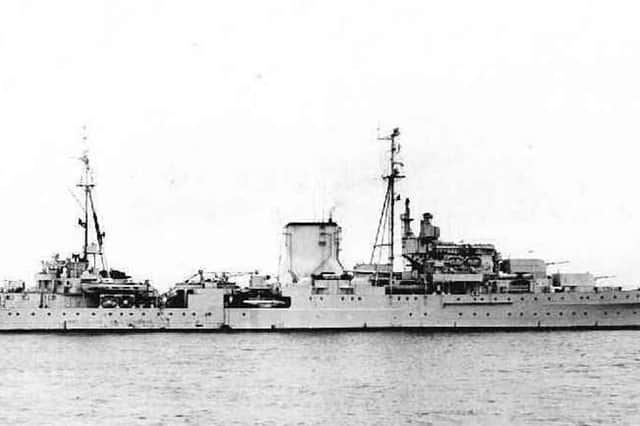NOSTALGIA: Twenty-nine dead in Portsmouth Dockyard explosion


In 1943 HMNZS Achilles, of Battle of the River Plate fame in 1939, had been in the dockyard for a three-month overhaul. Work was nearing completion and on the morning of June 22 workmen were in the stokers' mess about to have their breakfast.
Unknowingly, a gas bottle had been left open and had leaked its deadly load. It reached a welder's torch, ignited it, and tore open the inside of the ship.
Advertisement
Hide AdAdvertisement
Hide AdThe deck where the workmen were sitting was ripped open by the flaming explosion, leaving 29 dockyard workers dead and a further 60 severely burned or seriously injured.
It was one of the worst civilian workforce disasters of the war but, because of secrecy and wartime censorship of the time, not a word was printed in any newspaper '“ local or national.
The only clue was in the obituary notices in the Portsmouth Evening News referring to lost family and relations who had been accidentally killed at work.
In Jack S Harker's book HMNZS Achilles the following account tells of the gas bottle exploding, lifting the deck several feet, springing all the rivets and opening the stokers' decking some six inches:
Advertisement
Hide AdAdvertisement
Hide Ad'˜The flaming explosion burst through the fissure killing 29 maties and severely burning another 60.
'˜These poor men could not see for their burns and they staggered about in agony, climbing out of portholes out on to workers' staging and being lifted to safety.'
One of the rescuers was a stoker who was awarded the Albert Medal which later became the equivalent of the George Cross.
Stoker Bill Dale tied a seat rag over his nose and descended three decks through dense smoke to a collapsed compartment. There he found four injured men and passed them up to safety. He then went down again, but in vain.
Advertisement
Hide AdAdvertisement
Hide AdTwo other men, Stoker EÂ Valentine and Artificer WÂ Vaughan, also rescued some injured men but were only mentioned in dispatches for their efforts.
The cause was soon pinpointed.
All the gas bottles used for welding were kept on the dockside in case of detonation aboard if the ship was hit by bombs while in dock.
Long gas leads extended into the welders' torches in her various compartments.  It was the duty of one man to turn off the gas bottles each night.
At the end of the day one welder shut off his torch but, as he placed it on the deck, it was accidentally knocked back into the '˜on' position.
Advertisement
Hide AdAdvertisement
Hide AdThe following day the man reported in sick and no one else used his torch, but when the gas bottles were turned on as usual his was leaking for the entire day.
Being heavier than air, the gas lay low and was not noticed by anyone in the compartment. When the man returned to work the next day, it was presumed that he struck a match to light his torch and up went the ship. Nothing was ever found of the man or his assistant.
If a member of your family were among the casualties, please let me know.
'¢Reader Mick Davies has sent me a poser for anyone who has lived in the Waterlooville area for most of their lives.
Advertisement
Hide AdAdvertisement
Hide AdMike asks: '˜I wondered if any of your keen followers would know anything about a small army barracks at Waterlooville?
'˜It was situated just as you are leaving Waterlooville heading for Purbrook on the left hand side.
'˜I think in more recent years it had been added to and became the telephone exchange. I think its main role was to house troops who were about to be demobbed and in fact I think some of the original huts still exist.'